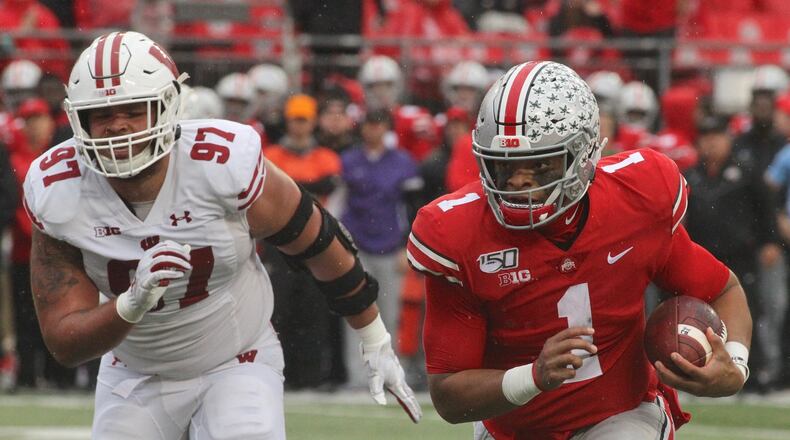In a statement that followed, Ohio State director of athletics Gene Smith said he and incoming university president Kristina M. Johnson were “totally aligned in our efforts to delay the start of the season rather than postpone. I am so grateful to her for all her efforts in support of our student-athletes and a traditional fall season.”
The conference had competed in football every season since 1896, but Big Ten commissioner Kevin Warren cited uncertainty for the league’s decision to end that streak at 125 years.
“I’m not a physician, but it was going to be very important that on a day-to-day basis that we would listen and follow and understand and appreciate and embrace the advice from our medical experts, and that’s what we’re doing here,” Warren said during an appearance on the Big Ten Network. “This is a holistic decision. There is too much uncertainty now for us to feel comfortable to go forward and have fall sports for the Big Ten, and we just need to constantly do the right thing from a medical standpoint to make sure that our student athletes are having an environment that remains both health and and healthy and safe.”
Asked what specific information the league had gotten from its Big Ten Task Force for Emerging Infectious Diseases and the Big Ten Sports Medicine Committee, Warren did not offer much by way of specifics.
“There’s there’s too much uncertainty,” Warren reiterated. “We have a lot of uncertainty going on now, and even questions that we asked and still asked, and it doesn’t mean that we’re giving up forever. I mean this is really our continuation of work, and an evolution. We’re going to continually have to gather information and look forward to the future, but there’s so much uncertainty.
“As we asked questions two weeks ago, some questions were answered, but then you ask more questions and then maybe those questions are answered, but then there’s new questions and then you ask questions even today. And it’s not only in the Big Ten, I think just across the country and in the world. There is so much uncertainty about this virus.”
In his own appearance on BTN, Smith cited contact tracing and potential long-term health effects for players who might contract the virus.
“We would have preferred to play — like everybody else — with the passion that our students have, but at the end of the day, medical advice and science overruled where we were today,” Smith said.
Field hockey, soccer, women’s volleyball and cross country were also postponed along with football while the status of winter sports that begin practice during fall months is uncertain.
Ohio State announce all its athletes would remain on scholarship and continue to be tested for COVID-19. They will also still have access to team facilities and locker rooms along with medical, training and nutrition areas.
Johnson, who was appointed in June after serving as chancellor of the State University of New York, said in a statement the university is focused on supporting athletes in every way and looking out for their health and safety as they continue to pursue their degrees.
“I deeply feel the pain, frustration and disappointment that all our players, coaches and staff – and all Buckeye fans – are feeling today,” said Johnson, who played field hockey and lacrosse at Stanford. “I will continue to work closely with athletics director Gene Smith, (football coach) Ryan Day and all coaches and other leaders, to return our student-athletes to competition as soon as possible, while staying safe and healthy.”
Later Tuesday, the Pac-12 also announced it was suspending all sports for the remainder of the calendar year in a vote the league said was unanimous.
About the Author

